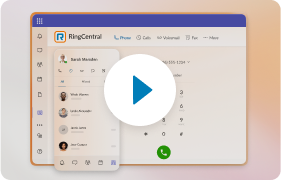If your reps are drowning in data but lacking insight into what gets prospects over the line, an AI sales assistant could be the answer.
There’s been a rise in AI adoption among salespeople, with one survey finding that 43% now use AI in their sales processes to boost efficiency and increase engagement. But what exactly does an AI sales assistant do, and which of the many available tools should you use?
Let’s explore the concept of AI-assisted sales, look at some use cases, and discover 10 of the best tools on the market.
10 best AI sales assistant software tools
Here’s a sneak preview of the 10 sales assistant AI tools we’re going to discuss:
- RingSense for conversation intelligence and admin automation ($60/user/month)
- Salesforce Sales Cloud for analysis and recommendations ($165/user/month)
- HubSpot Sales Hub for streamlining outreach ($90/seat/month)
- Regie.ai for automatically warming up leads (from $35k)
- Lavender for email intelligence and guidance ($89/seat/month)
- Pipedrive for sales pipeline management and CRM ($49/seat/month)
- Clay for prospecting and data enrichment ($134/month)
- UserGems for signal tracking and email creation ($2,500/month)
- Forwrd for predictive scoring and forecasting (contact vendor for pricing)
- Humantic AI for buyer intelligence ($220/month)
What is AI sales assistant software?
AI sales assistant software refers to any software tool that uses artificial intelligence to help sales reps do their jobs. These solutions are designed to make selling easier and boost performance by streamlining sales workflows and providing valuable insights.
Artificial intelligence is embedded into these tools, encompassing machine learning, natural language processing, predictive analytics, and smart automation. There are myriad ways to use AI for sales enablement, from prospecting and lead scoring to outreach and relationship-building.
Use cases for AI-assisted sales and marketing
There are many different ways in which an AI-powered sales assistant can help with sales and marketing tasks:
- Prospecting and lead generation: AI sales assistants can scrape the web or go through existing contact lists for the most relevant leads, identifying those that match your ideal customer profile (ICP) or other criteria. This saves hours of manual research.
- Lead scoring: These tools will then score the leads according to your criteria, and advise you on which ones to prioritize. Some virtual assistants will also update you when leads demonstrate buyer intent signals.
- Email outreach: AI-powered sales outreach includes generating personalized email messages tailored to each prospect’s personality (as well as other types of text such as call scripts). A virtual assistant can optimize the timing of your outreach to improve engagement, and run tests to see which messages work best.
- Task automation: As well as prospecting and outreach, AI sales assistants can take care of other time-consuming tasks such as data entry, appointment scheduling, and transcribing and summarizing calls and meetings.
- Conversation intelligence: Using sentiment analysis, AI tools will detect how customers are feeling during interactions and display the insights in real-time, so that you can act quickly if engagement levels drop. The software will also track key words and phrases.
- Sales coaching: AI sales assistants offer guidance to reps throughout the sales process, with real-time coaching in the form of recommendations. They can also perform post-call analysis and track performance metrics to highlight areas for improvement.
- Predictive analytics: AI models can predict the leads who are most likely to convert and the best times to reach out to them—and show you which customers are at risk of churning. This helps you to adjust your sales strategies and anticipate demand.
How to choose an AI virtual sales assistant tool
So, we know the most common use cases for an AI-powered virtual sales assistant tool. To pick the right one for your needs, look for a tool that:
- Suits your selling style: A new tool shouldn’t force you to change your sales workflows. Look for a solution that fits in with how you sell, while enhancing your processes.
- Has genuine AI power: Some vendors describe tools as AI-powered, when they’re actually just automation tools. You need an assistant with true decision-making capabilities, based on machine learning and natural language processing (NLP) so that it can learn from your data, understand context, and generate human-like text.
- Saves you time: Of course, automation is a key part of AI-based sales assistant tools. Look for software that lets you set rules and triggers, so that it can handle simple repetitive tasks without needing constant oversight. That way, your reps will have more time to focus on strategic aspects of the sales process.
- Delivers actionable insights: Look out for real-time and predictive analytics to track and analyze sales performance, lead engagement, and customer behavior, customizable reporting, and dashboards
- Integrates with your tech stack: Your AI sales assistant should connect seamlessly with your existing software and systems, especially your CRM and communications tools. When the data syncs automatically between tools, you can avoid manual data entry and constant toggling.
- Scales as you grow: An AI assistant for sales teams should be able to ramp up its performance under increased demand. Check how many leads and interactions it can handle simultaneously.
- Is cost-effective: As well as the likely productivity gains, look for a solution that offers value for money (which means different things to different businesses) and the potential for high ROI.
- Provides robust support: Look at recent reviews to see what users think of the vendor’s support team for onboarding and responding to software issues.
- Keeps your data safe: Top-notch security is essential when you’re handling customer data and staying on the right side of compliance regulations.
10 top AI sales assistant software tools
As you can imagine, there’s a ton of options on the AI sales assistant software market. We’ve put together our top 10, with all the info you need to help you choose the best AI sales assistant for your team. Let’s start with a handy comparison table before getting into the details:
| Tool | Best for | Pricing |
|---|---|---|
| RingSense | Conversation intelligence | $60/user/month |
| Salesforce Sales Cloud | Analysis and automation | $165/user/month |
| HubSpot Sales Hub | Streamlining outreach | $90/seat/month |
| Regie.ai | Warming up leads | From $35k |
| Lavender | Email intelligence | $89/seat/month |
| Pipedrive | Pipeline management | $49/seat/month |
| Clay | Automated prospecting | $134/month |
| UserGems | Tracking buyer signals | $2,500/month |
| Forwrd | Predictive scoring models | Contact vendor |
| Humantic AI | Buyer intelligence | $220/month |
1. RingSense

RingSense by RingCentral is AI sales assistant software that combines AI and natural language processing (NLP) to deliver powerful conversation intelligence for sales teams. It monitors your interactions and gathers valuable insights from elements like tone and sentiment, and highlights the topics prospects are interested in.
The tool tracks keywords and phrases used by leads, picking up on things like competitor names, product features, and common objections. It also automates scoring by evaluating conversations with interaction analytics, revealing opportunities to improve relationships.
RingSense saves time by automatically transcribing and summarizing voice and video calls as well as emails, capturing the key points and updating your CRM. By scoring calls and deals, it shows you the types of conversations that lead to specific results.
The tool also analyzes performance metrics and identifies coaching opportunities for teams and agents. Coaching tools such as sales manager scorecards help to prioritize conversations—and specific segments—that need the most attention, so managers can provide detailed feedback.
RingSense enhances the RingCentral suite of products including RingEX, RingCX, and RingCentral Contact Center. Users say the tools are easy to implement and use, according to reviews.1
Pricing: RingSense is available for $60/user/month, when you subscribe to RingEX, RingCX, or RingCentral Contact Center.
2. Salesforce Sales Cloud
Salesforce Sales Cloud is an AI-powered platform that provides an overview of your sales activities and helps you to prioritize and engage with the right prospects. It automatically ranks your leads based on engagement, historical data, and the customer profiles that drive the most revenue.
This Salesforce AI sales assistant analyzes ongoing sales activities and recommends the best way to engage with each prospect. In fact, there’s guidance for sellers throughout the sales process, plus the ability to predict sales trends with AI-driven forecasting.
The platform boosts efficiency by automating complex sales processes and workflows and creating actionable to-do lists. You can also enhance its capabilities when you integrate Salesforce and RingCentral, as reps can make calls (and send SMS) directly within Salesforce.

Reviewers praise the tool’s analytics and reporting, but mention that it can be complex to customize.2
Pricing: Salesforce Sales Cloud prices start at $25/user/month, but you don’t get the AI tools until the Enterprise tier at $165/user/month. The full AI suite is available with the highest-priced plan ($550/user/month).
3. HubSpot Sales Hub
HubSpot Sales Hub gives you a set of AI-powered sales engagement tools to help you streamline outreach and find the best opportunities. You can access data on how prospects engage with your content, while the AI finds the best leads and recommends high-impact actions.
It also lets you create an automated series of personalized communications that adapt according to prospect engagement. Among the many integrations is the option to connect HubSpot and RingCentral—enabling you to add a smart dialer and manage all your comms in one place.

Plus, you can track sales team performance and accurately predict revenue. Meanwhile, the AI Breeze Customer Agent handles conversations on multiple channels, answering pricing questions, and resolving simple issues.
Reviewers give a thumbs-up to the organizational capabilities, but agree that pricing can be high with some features only available in higher tiers.3
Pricing: HubSpot does offer a free plan, but you’ll need the Professional tier ($90/seat/month) or higher to access Breeze.
4. Regie.ai
Regie.ai offers several AI sales assistance products to help with prospecting and outreach. RegieOne is an all-in-one sales engagement platform that enables human reps and AI agents to work together on lead sourcing, data enrichment, dialing, and emailing.
The AI Dialer product sees AI agents warm up audiences with relevant messages via emails and social media—and when they show intent, the tool generates priority call tasks for reps. It also creates tailored call scripts that address specific pain points for each prospect.
The AI Agents product can be bundled with the Dialer, used natively within RegieOne, or connected to your existing sales engagement platform. AI Agents handle prospecting tasks such as audience discovery as well as automating outreach and suggesting next-best actions based on engagement levels.
Users are impressed by the tool’s speed and customization options, although some have had to tweak AI messages to sound more human.4
Pricing: Both the AI Dialer and the AI Agents + AI Dialer packages start at $35k. RegieOne is available free with an annual contract for AI Agents + AI Dialer.
5. Lavender
Lavender is an email intelligence platform for sales teams, operating as a browser extension that syncs with your inbox and gives advice on creating the perfect message. It tracks email activity and performance, including metrics like clarity, readability, and open/reply rates.
The Email Coach feature scores your emails and templates and suggests instant improvements to anything that’s damaging performance. The Personalization Assistant suggests ways to personalize your email, based on prospect data and personality-based insights.
You can turn bullet points into new messages, and there’s a mobile preview tool to ensure your message is readable on all devices. Lavender integrates with major CRM, sales intelligence, and email systems.
Reviews state that the platform is easy to use with helpful insights, but has the odd glitch and patchy customer support.5
Pricing: There’s a free plan but it doesn’t include the AI email writer or recommendations—you’ll need the first paid tier for this ($27/month, for individuals) or the Team plan ($89/seat/month).
6. Pipedrive
Pipedrive is a sales CRM and pipeline management solution with AI tools including an AI-powered Sales Assistant. This feature continuously analyzes your deals, contacts, and emails, finding insights and opportunities and generating reports and notifications.
The AI will identify patterns and high-potential deals as well as tracking team performance. You’ll receive intel on win probability and recommendations for the next best actions to take. The platform becomes smarter over time as it adapts to your needs and sales patterns.
The Sales Assistant even has a SmartApp recommendation feature that suggests the most suitable apps for your team’s needs. Pipedrive also offers an AI email writer tool that creates messages from custom prompts and summarizes the emails you receive.
Users who reviewed the product loved the automations but said it wasn’t intuitive to set up, and that the reporting lacked depth.6
Pricing: There are AI features in the lowest tiers (from $14/seat/month) but you’ll need to upgrade to the Professional tier ($49/seat/month) for the Sales Assistant.
7. Clay
Clay is a tool for enriching prospect data through automated research, allowing you to save on manual labor. It scrapes the web and collects data on anything from contact details to firmographics to funding information, as well as flagging fraudulent domains.
Clay has a built-in OpenAI research agent called Claygent, which combines Google search, web scraping, and ChatGPT. It will research any company based on its website or public information on the web, find the specific intel you want, and report back.
You can push the enriched data to your CRM, data warehouse, email tool, CMS, or ad manager. You can also automatically track and act on key customer events, and there’s an AI message writer to help you with personalized outreach at scale.
Users say there’s a lot to like in terms of features and flexibility, but that payment (in credits) could be more transparent.7
Pricing: All plans come with AI. There’s a free plan, with paid tiers starting at $134 per month—all priced according to how many credits you need.
8. UserGems
UserGems is an AI sales assistant that tracks buyer signals and notifies reps when it’s time to take action. It provides full context for warm outreach, and automates the process with pre-built outbound plays or custom campaigns.
You can use the tool’s native signals or combine them with your own data on intent, product usage, or purchase history. For example, you can track changes such as company growth or job changes, and monitor target accounts for new hires and promotions that match your persona.
UserGems’ AI agent, Gem-E, combines first- and third-party data and scores and prioritizes leads. It then drafts email sequences, call scripts, and LinkedIn messages. It also brings insights, emails, and talk tracks right into your CRM and sales engagement tools.
Reviews suggest that the platform is effective and efficient, but that there’s limited integration with some platforms, including social media.8
Pricing: Starts at $2,500/month for up to 20 users. There are two higher tiers (for up to 40 and 70 users respectively), or you can contact UserGems for enterprise pricing.
9. Forwrd
Forwrd is an AI-powered predictive lifecycle platform that delivers revenue intelligence for go-to-market (GTM) teams. It’s a unified system for building, deploying, and operationalizing predictive models, with AI agents to automate your data pipeline.
You can create a self-learning scoring model that scores leads and accounts, prioritizes sales opportunities, and predicts churn. Discover which leads are most likely to become SALs, identify sale-ready trial users, and identify your most engaged contacts via the HubSpot integration.
When you set your KPIs, the AI will analyze your historical data and compare it against your business objective to reveal the factors and values with the highest correlation. You can also forecast future sales trends, and run territory management for balanced opportunity distribution.
Users praise the onboarding process and support, but a couple of people mention that they’d like to see tutorial videos for extra guidance.9
Pricing: You have to contact Forwrd for pricing, or to book a demo.
10. Humantic AI
Humantic AI is a buyer intelligence platform for revenue teams who use DISC selling (a method that divides prospects into four different personality types). It delivers deep insights into prospects’ preferences and values, enabling more personalized interactions.
The proprietary Personality Prediction AI builds around a prospect’s AI-predicted DISC profile, revealing more than just firmographics and job details. Reps can discover what really matters to prospects, and get tips on what to say and what not to say.
The Humantic Chrome Extension shows you insights within your most-used apps, including CRM, sales engagement platforms, and social channels. There’s also a dashboard where you can analyze multiple buyer personalities.
Reviewers say the tool is fast and accurate, but that it’s a little LinkedIn-centric and the UI could do with modernization.10
Pricing: For organizations, prices start at $220/month (5 to 20 users). There’s also a set of tiers for individual users.
General AI tools that can help streamline sales
Aside from a dedicated AI assistant for sales, there are plenty of other AI tools a sales professional may find useful.
Appointment-scheduling tools are handy for keeping track of meetings, syncing with your digital calendar and sending reminders to you and your prospect.
Generative AI tools can save time when you’re creating emails and call scripts, analyzing the prospect’s browsing history and previous interactions to help you personalize the content. You can also use these tools to generate video content, such as presentations and product demos.
AI-powered chatbots can handle inquiries about pricing or product features, gathering information while holding a natural-sounding conversation. Similarly, an AI receptionist can take care of routine questions and direct inbound calls to the right person. Both tools work 24/7.
How about an AI personal assistant for tasks like note-taking, conversation summaries, and translation? That’s what you get with RingCentral, along with the benefits of unified communications for connecting with prospects, customers, and colleagues on all channels.
The right AI sales assistant tool can take your reps to a new level
Sales reps can easily get overwhelmed by the sheer amount of data on prospects, leads, and customers. Plus, it can be hard to keep track of multiple conversations and deals. AI sales assistants take some of this pressure off and help reps to focus their priorities.
The right software quickly analyzes data, recommends next-best actions, and monitors interactions for valuable insights. While it’s not a substitute for your highly-skilled team, it automates the manual processes that take up so much of their time.
RingSense by RingCentral does all this and more—extracting insights from every conversation, providing live coaching tips, and taking care of the admin so that sales teams can devote their attention to making human connections.
AI sales assistant FAQs
Which is the best AI sales assistant tool for me?
The best AI sales assistant for you will depend on what you’re looking for, but RingCentral RingSense gives you multiple AI-powered features in one tool. It provides conversation intelligence through sentiment analysis and tracking keywords and phrases, as well as automating scoring. The tool also analyzes performance metrics, provides coaching tips, and summarizes the key points of each interaction.
How do AI sales assistants improve the sales process?
An AI virtual sales assistant boosts efficiency by handling routine tasks, as well as delivering key insights that help reps to build better relationships. These tools can help with prospecting, lead scoring and prioritization, and forecasting—and assist reps in crafting personalized messaging to engage prospects.
Can AI replace salespeople?
There are many uses for AI in sales. It excels at analyzing large volumes of data, capturing insights, and creating content much faster than humans can. However, human salespeople are still essential for making personal connections, handling complex deals, and checking that AI is getting things right. An AI-enabled sales assistant works best in tandem with your human team, enhancing rather than replacing their skills.
Footnotes
- https://www.g2.com/products/ringcx/reviews?utf8=%E2%9C%93&order=most_recent
- https://www.capterra.com/p/61368/Salesforce/#reviews
- https://www.capterra.com/p/214215/HubSpot-SalesHub/reviews/
- https://www.g2.com/products/regie-ai/reviews?order=most_recent&page=2
- https://www.g2.com/products/lavender/reviews?utf8=%E2%9C%93&order=most_recent
- https://www.capterra.com/p/132666/Pipedrive/reviews/
- https://www.g2.com/products/clay-com-clay/reviews?utf8=%E2%9C%93&order=most_recent
- https://www.capterra.com/p/251853/UserGems/#reviews
- https://www.g2.com/products/forwrd/reviews?order=most_recent&page=1
- https://www.g2.com/products/humantic-ai/reviews?order=most_recent&page=2
Originally published Jul 15, 2025












